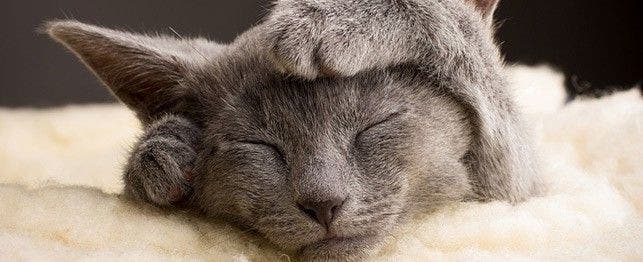
Cats and Sleep: What You Need to Know
Cats are such proficient sleepers, they’ve even had a common term coined from their napping abilities.
A “catnap” – a short, light sleep – represents just one of many types of slumber our feline friends have mastered. After all, the average cat sleeps away more than half of each day’s 24 hours.
Yet, despite being adept at sleeping, cats also tend to be irritatingly skillful at preventing their human companions from getting enough rest. They sleep most of the day, then exude their peak energy level right as we’re trying to settle down for the night.
Just what can we ascertain about cats’ sleeping habits, and how can we use this information to improve our chances, as cat owners, of achieving a good night’s rest? Let’s borrow the cat’s curiosity and delve into this topic to find out.
Cats Have an Incredible Propensity for Sleeping
Cats represent some of the animal kingdom’s best sleepers, snoozing on average anywhere from 13 to 18 hours per day. That’s a feat exceeded by only a handful of other animal species, such as bats and opossums.
It’s a common misperception that cats are nocturnal. While they do sometimes awaken and explore during the night, cats are actually crepuscular, meaning they’re most active at dawn and dusk.
The modern indoor cat sleeps primarily out of boredom. By providing your cat with more activities to keep him occupied during the day, your cat will be more inclined to sleep at night.
Cats Actually Do Take Catnaps
It turns out the catnap strategy is used beyond college students attempting to kill time in between classes. Cats do, in fact, nap in the manner bearing their name.
Although kittens sleep most of the time, as young cats mature toward adulthood, they alter their sleeping patterns to take a series of short naps rather than one long rest. They still sleep a great deal, though in a state that’s not as deep.
The catnap was born from a domestic cat’s ancestry. Cats in the wild needed to be alert in order to avoid predators and survive. Even today, your cat typically sleeps softly, opening his eyes frequently to assess a situation.
Cats Like to Sleep on Something
The concept of creature comforts is not lost on felines. Whether it’s a folded blanket, a cat bed, a couch, or a window sill, cats like to sleep on something, occupying an elevation that provides for better vision of their surroundings and thus, more protection.
This “something” often amounts to a human bed. A recent online survey revealed that 96 percent of cat owners allow their cats to sleep in the bedroom and half of cats are allowed to sleep on the owner’s bed.
Many cat owners enjoy having a purring bedmate and believe the experience of sharing a bed strengthens the human-feline bond. But be forewarned – cats are fascinated with anything that moves, and may be prompted to pounce on your hand or foot should you shift during sleep.
Cats Can Get the “Midnight Crazies”
Most cat owners know the routine: Your feline awakens in the middle of the night and acts as if his hair has been set on fire. You cat jumps off the bed, scurries across the floor, and pounces on nothing in particular.
This burst of energy – often referred to as the “midnight crazies” – occurs when your cat plays and roughhouses in short spurts in the middle of the night. It’s as distracting to you as it is enjoyable for your cat.
Several theories exist as to why cats become stricken with the midnight crazies. These include your cat’s need to blow off steam following a sedentary day and your cat’s desire to practice his hunting skills. Whatever the reason, this behavior can proves both entertaining and frustrating for cat owners.
The Cat Alarm Clock Phenomenon – What Can be Done?
Many of us despise alarm clocks, hitting the snooze button repeatedly or sleeping through the alarm altogether. But what can be done when your cat serves the less-desirable role of alarm clock?
The cat alarm clock has a two-fold origin: Nature, in that your cat’s internal clock signals to your cat that it’s time to awaken at dawn, and nurture, in that many cat owners incentivize their felines to wake up early by offering food and attention.
The following techniques can assist with preventing your cat from dictating your morning wakeup call:
- Ignore your cat’s attempts to wake you up.
- Invest in thick curtains that keep the sunrise from invading your bedroom.
- Refrain from feeding your cat first thing in the morning.
- Ensure your cat receives proper play and exercise during the day.
Does Your Cat Sleep Too Much?
As discussed earlier, cats sleep the majority of the day (13 to 18 hours). Moreover, indoor cats tend to sleep even more than outdoor cats, as they have fewer sources of stimulation to occupy their time. But how much sleep is too much for a cat?
While it’s normal for a cat to sleep a considerable amount of time, there are three explanations for why your cat might sleep even more than the average feline: 1. sickness, 2. boredom and 3. advanced age.
Should you have reason to believe any of these three factors is contributing significantly to your cat’s excessive sleeping, it’s worthwhile to schedule a vet checkup. Knowing your sleepy cat is healthy and happy will help you to rest easy.